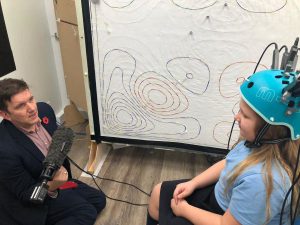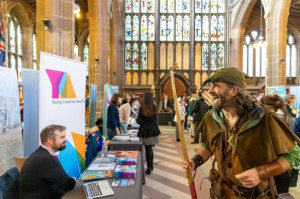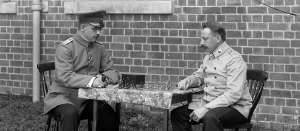
December 19, 2019, by Liz Goodwin
University News Review — October and November 2019
Welcome to the autumn 2019 News Review which features some of the Press Office’s top news stories from October and November…
Bike helmet-style brain scanner used for first time with children
 A new wearable bike helmet-style brain scanner could make scans easier and more reliable in children, according to University of Nottingham researchers.
A new wearable bike helmet-style brain scanner could make scans easier and more reliable in children, according to University of Nottingham researchers.
The Mail Online reported on the helmet which allows natural movement during scanning, and has been used on a study with young children for the first time.
Scientists Ryan Hill, the PhD researcher who led this new study, and Professor of Physics Matt Brookes, who leads the MEG research at the University, spoke to BBC East Midlands Today, BBC Radio Nottingham and Gem 106, to explain how the new scanner allows children to move during scanning.
The previous problem with MEG scanners was that they were bulky and weighed nearly half a ton and required the child to sit still for nearly 20 minutes. Ryan explained: “This new technology can be worn just like a hat, so it means you can move around, be as relaxed as you want and do natural tasks, rather than just staying rigid.”
The new technology will help with the understanding of brain development and will look into conditions such as epilepsy and autism.
Professor Matt Brookes added: “We want to find out what the switch is that’s flipped when children learn to walk and talk, and with this technology, we think we’ll be able to work this out.”
Jane Icke, Media Relations Manager for the Faculty of Science, who collaborated with Ryan and Matt to bring media attention to the story, and her daughter nine-year-old Alice, went along to the BBC filming. Alice demonstrated the new portable MEG scanner and told BBC Health Correspondent Rob Sissons: “I think it looks like a weird bike helmet, and it feels quite comfortable.”
Father’s diet could affect the long-term health of his offspring
 New research from the University has shown that it’s not just a mother’s diet that can affect the health of their babies, but in fact a lack of protein in a father’s diet affects sperm quality, which can have a direct impact on the long-term health of their offspring.
New research from the University has shown that it’s not just a mother’s diet that can affect the health of their babies, but in fact a lack of protein in a father’s diet affects sperm quality, which can have a direct impact on the long-term health of their offspring.
Charlotte Anscombe, Media Relations Manager for Medicine and Health Sciences, arranged for BBC East Midlands Today, BBC Radio Nottingham and Gem 106 to speak to Assistant Professor in Reproductive Biology Adam Watkins who wants to encourage people to improve their health before trying for a baby. Dr Watkins said: “Research such as ours will hopefully add extra weight to men and women wanting to change their lifestyle before becoming parents.”
The study carried out on mice, found that males fed a low-protein diet produced sperm with fewer chemical tags of their DNA that regulate gene expression than mice fed a normal diet.
Welcome to Nottingham!
 Almost 500 international students travelling from more than 80 countries around the globe to study at Nottingham’s two world-class universities were given a warm welcome in October at the first ever Civic Reception to mark their arrival in their new home.
Almost 500 international students travelling from more than 80 countries around the globe to study at Nottingham’s two world-class universities were given a warm welcome in October at the first ever Civic Reception to mark their arrival in their new home.
BBC East Midlands Today, BBC Radio Nottingham and the Nottingham Post all reported on the pioneering event which was jointly organised by the University of Nottingham and Nottingham Trent University.
University of Nottingham Vice-Chancellor Professor Shearer West, told the BBC: “I think this event is an important way for us to say we are an inclusive community and that we welcome people from all parts of the world and from all ethnicities into our university.”
Hosted by Robin Hood, the event at St Mary’s Church in the city had a festival feel and featured performances from local artists, international societies, and celebrated the vital contribution made by international students to the local economy, community and cultural richness of Nottingham.
The Engineer Collaborate to Innovate Awards 2019
 The University of Nottingham was delighted to discover in November that it had won three out of seven categories in the prestigious The Engineer ‘Collaborate to Innovate Awards 2019.’
The University of Nottingham was delighted to discover in November that it had won three out of seven categories in the prestigious The Engineer ‘Collaborate to Innovate Awards 2019.’
The night celebrated innovations across sectors including medical, automotive, aerospace and manufacturing, with this year’s event being timed to coincide with the Royal Academy of Engineering’s This is Engineering Day — an initiative aimed at raising awareness of how engineers shape our world.
Katie Andrews, Media Relations Manager for the Faculty of Engineering, worked with the academics to expertly craft the entries which went on to win the Energy & Environment category for SCENe (Sustainable Community Energy Networks); and secure collaborative wins for the Information, Data & Connectivity category, and the Manufacturing Technology category.
The winner of this year’s Energy & Environment category — led by a team from the University of Nottingham — have pioneered community energy network technology. Judged by a panel of leading UK engineers, winning entries had to demonstrate that they were innovative, collaborative and likely to have an impact in their field of application.
Project SCENe is a working partnership between engineers at the University, housing developers, the energy supply chain, a trading platform, industry and Nottingham City Council, that is transforming local energy infrastructure and is aiming to roll out across the UK.
The project applies multi-vector energy systems, including solar power and localised energy storage, combined with carbon neutral housing technology, to create what the partners say is the first robust and “smart” business model for sustainable community energy. The team led by Professor Mark Gillott, Chair in Sustainable Building Design at the University and the academic lead for project SCENe, built an early demonstrator living lab at the University, using smart technology to monitor and record energy shared usage, which gave commercial partners the reassurance to scale it up.
Hidden histories of WWI German prisoners of war revealed
 An exhibition of rare photos from 100 years ago that revealed what life was like for German soldiers in a WWI prisoner of war camp based at the University’s Sutton Bonington campus, was featured on BBC East Midlands Today and BBC Radio Nottingham.
An exhibition of rare photos from 100 years ago that revealed what life was like for German soldiers in a WWI prisoner of war camp based at the University’s Sutton Bonington campus, was featured on BBC East Midlands Today and BBC Radio Nottingham.
Media Relations Manager for Arts, Emma Rayner, worked with Mike Noble in the Department of History on the story which also appeared on BBC News Online and in The Conversation.
The exhibition is part of a research project involving historians from the University of Nottingham and the WW Winter Heritage Trust in Derby. Founded in 1882, WW Winters is believed to be the longest running photography business in Britain. The photographs were taken by Winter’s photographers at the PoW camp in and around 1917.
“The main building of the Sutton Bonington campus was built in 1915, when it was intended to be used as the midlands agricultural college, but unfortunately the war came and interrupted that. It was then taken over and used as a prisoner of war camp for German officers,” Mike told the BBC.
The exhibition revealed stories of attempted escapes — military prisoners were duty-bound to attempt escape and this was certainly true of the East Midlands prisoners. In September 1917, 23 prisoners managed to dig a tunnel and flee. However, having escaped they then struggled to put much distance between themselves and the camp. All were swiftly recaptured. The only successful escape, indeed the only successful escape by any PoW held in Britain in either of the World Wars, was made by Gunther Plüschow, who made it back to Germany via the Netherlands in July 1915.
Also revealed was the camp’s alleged luxurious conditions. For this it attracted much negative attention in the House of Commons and the British press. Photographic evidence reveals the camp had a billiard room, a football pitch, a bowling alley and facilities for gardening.
And finally… the Periodic Table lights up Trent Building for Chemistry Week
 On 22 November, the University lit up in support of Chemistry Week as part of the International Year of the Periodic Table.
On 22 November, the University lit up in support of Chemistry Week as part of the International Year of the Periodic Table.
The eye-catching display saw the Periodic Table come alive across the campus as it joined 11 leading universities across the UK to highlight a serious issue — the threat to a growing number of elements through a lack of recycling old tech devices.
Mirage News and the Royal Society of Chemistry ran the story, which was timed to make people think twice in the run up to the Black Friday sales and the approaching festive season, and encourage them to reuse their old devices, recycle them, or donate them to recycling charities.
Professor of Chemistry Jon McMaster, said: “We were delighted to be able to celebrate this landmark year for the Periodic Table with the Royal Society of Chemistry in this way. Our University has so much chemical heritage; from our connections with the Boots family to the development of the Carbon Neutral Laboratory in collaboration with GSK. The University is also home to the very successful Periodic Table of Videos YouTube channel, which continues to excite the next generation of students who will explore the elements of the Periodic Table with us and who will work towards the development of green and sustainable chemical processes for the future.
“What a great way to celebrate this important year and the contributions Nottingham has, and continues to make, to our understanding of the elements.”
No comments yet, fill out a comment to be the first

Leave a Reply